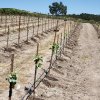In 2010, the so-called "2010 Protocol" was launched, defining the criteria that grapevine must meet in order to be planted in their new foundation vineyard Russell Ranch.
Since then, growing number of grape varieties has been arriving at the Russell Ranch Collection, where continued work is done to prepare them for potential commercial use. The first specimens of Vranac arrived in the 1970s, thanks to prof. Lazar Avramov. Later on, a group of varieties from the Balkans (Montenegro, Macedonia, Dalmatia) arrived from Slovenia to UC Davis nursery and implementation of the 2010 Protocol began with an ambition to place those vines in the Russell Ranch foundation vineyard.Good news is that the vines were granted the status of approved in 2018 so the first certified virus-free Vranac vines were planted in Russell Ranch foundation vineyard. They will be used to provide limited quantity of vines for commercial nurseries. We hope that in the years to come, more and more wineries from the USA will find an interest in planting Vranac. The pioneer in this venture is Opolo Winery located in Paso Robles, California. Rick Quinn, the owner of Opolo winery, has family roots in Herzegovina and Montenegro, so it doesn't come as a surprise that he feels the region of former Yugoslavia particularly close to his heart. In addition, to mark the celebration of the 800th anniversary of the Serbian Orthodox Church, Opolo Winery created a wine label Autocephaly that will be distributed throughout the United States.
This is a great piece of news for Vranac and it is in line with recent California trends where more and more wineries are experimenting with Mediterranean grape varieties to respond timely to global climate change. There are indications that in the coming decades, it will be increasingly difficult to cultivate premium quality Cabernet Sauvignon in some parts of California, so wineries have already started experimenting with adequate alternatives. Anyhow, knowing the family links between Kratošija / Zinfandel and Vranac, it won't be difficult to present qualities of Vranac to US winemakers.Source: Vinopedia, 08/18/2019







